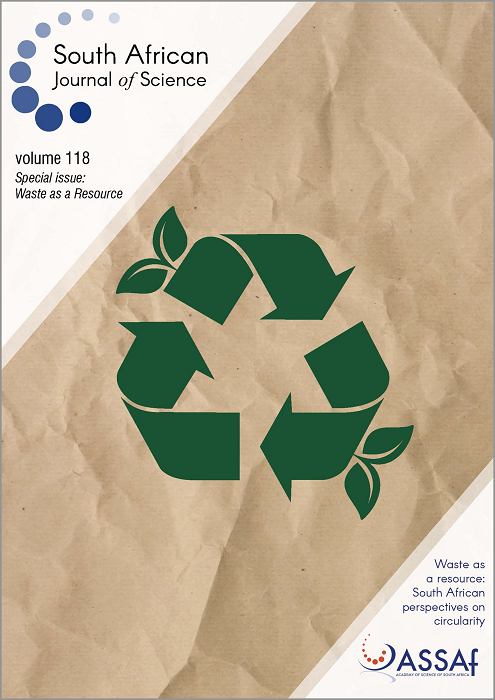Considerations on bio-hydrogen production from organic waste in South African municipalities: A review
DOI:
https://doi.org/10.17159/sajs.2022/12652Keywords:
2-stage AD, bio-hydrogen, organic waste, Integrated Waste Management System, WROSE™ modelAbstract
Organic waste disposal contributes to 3.8% of GHG emissions to the atmosphere, yet 68.8% of this putrescible waste fraction is still disposed of, untreated, to landfills in South Africa. The implementation of a ban on disposal of organic waste to landfills at provincial level opens up the need to research best technology pathways and waste minimisation strategies to valorise and promote the circularity of diverted waste streams. The SARChI Chair in Waste and Climate Change has developed the WROSETM (Waste Resource Optimization Scenario Evaluation) model to assist municipalities in selecting the most appropriate waste management solutions. A research gap has been identified in the lack of information on full-scale applications of two-stage anaerobic digestion (2-stage AD) for combined bio-hydrogen and bio-methane production from organic waste. waste. In this review, we explore drivers and barriers to the implementation of 2-stage AD in South Africa and propose possible scenarios using the WROSETM model for its insertion into an Integrated Waste Management System at municipal level. A literature analysis suggests that 2-stage AD is a potentially viable solution to recover the inherent value of organic waste and promote circularity using bio-hydrogen and bio-methane. However, the currently available organic fraction in the municipal solid waste streams is not a suitable feedstock, as it requires high levels of pre-treatment. Suitable scenarios using the WROSETM model are proposed for South African municipalities, paving the way for future research towards the scale-up of this technology.
Significance:
- Organic waste is not managed adequately in South Africa, contributing to greenhouse gas emissions without recovering the intrinsic value of the material.
- 2-stage AD is a potentially viable solution to recover the inherent value of organic waste and promote circularity using bio-hydrogen and bio-methane. Several barriers must be overcome before carrying out the technology at full-scale.
- A 2-stage AD scenario can be implemented at full-scale into an Integrated Waste Management System using appropriate decision-making tools such as WROSETM.
Published
Issue
Section
License

All articles are published under a Creative Commons Attribution 4.0 International Licence
Copyright is retained by the authors. Readers are welcome to reproduce, share and adapt the content without permission provided the source is attributed.
Disclaimer: The publisher and editors accept no responsibility for statements made by the authors
How to Cite
- Abstract 925
- PDF 782
- EPUB 296
- XML 326
Funding data
-
Department of Science and Innovation, South Africa
-
National Research Foundation
Grant numbers 115447












.png)